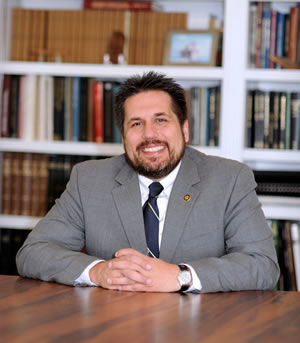Nov 22

(What follows is an open letter from Lake Superior State University President Tom Pleger to LSSU and both Sault Ste. Marie communities)
Lake Superior State University opened its doors over 70 years ago under the GI Bill in 1946. At that time, it was an access institution founded as a branch college to serve returning World War II veterans. From its historic Fort Brady roots, LSSU has grown to offer a wide array of academic programs, extracurricular programs, and community outreach programming.
Today, public higher education is changing at an unparalleled pace. Lake State continues to be an institution that provides outstanding value and access to higher education opportunities, not only for our students, but also for the communities we serve. However, we need to look toward the future and plan accordingly to position LSSU to meet the demands of Michigan and the region’s future needs.
As we look to the future, LSSU is positioning itself for long-term sustainability and growth, a focus on excellence, a continuous mode of academic program review and update, and a plan for maintaining and enhancing our facilities. We are moving ahead with a new health care Simulation Center in partnership with War Memorial (our local hospital), and we are in the engineering assessment and planning stages for the new Center for Freshwater Research and Education facility. We are also developing long-term infrastructure plans for upgrading aging facilities and systems for lighting, electricity, information technology, and building climate control.
This spring, we opened a newly renovated South Hall as home for the Lukenda School of Business. The new R. W. Considine Hall (formally South Hall), which has its formal rededication on April 21, will also serve other disciplines and will become another community focal point on the LSSU campus and the Eastern Upper Peninsula of Michigan.
Lake State has also launched a new shared governance and strategic planning process focused on Culture, Academics, Finances, and Enrollment (CAFÉ). We have created a strategic committee for each of the institutional core CAFÉ areas with membership from across the campus. Each strategic committee is charged with setting goals, outcomes, and assessment of progress in each of their respective areas. Together, we are working to build an even better institution that is focused on excellence in all areas of its operations.
LSSU is in the final stages of completing its Higher Learning Commission (HLC) regional reaccreditation process. All recognized universities in the US go through a regional reaccreditation process on regular intervals. This process is guided by peer review of a compliance report, assurance argument, and a campus visitation by a team of colleagues to verify the quality and health of our institution. I have been through numerous reaccreditations and always find it to be an outstanding opportunity to foster institutional excellence. In early March, we received a favorable HLC review and LSSU has been reaccredited. LSSU will continue on the Standard Pathway for future reaccreditation reviews. In a separate communication, we learned that our Change Request to offer a Master of Business Administration (MBA) program was not approved at this time. Rather, the HLC provided a road map of steps to be taken by the institution to garner such approval, issues included faculty qualifications and scholarship/professional development, and policies and practices for graduate education.
That said, reaccreditation reports always offer recommendations for improvement. We expect ours to focus on LSSU’s excellent hands-on experiences along with suggestions to improve diversity, assessment processes, program review, and to improve our faculty-staff evaluations of scholarship, research, and teaching. These recommendations will serve as a roadmap to guide the institution over the next five to ten years in our planning, evaluation, and assessment of all operations and programs.
In addition to LSSU planning, I have spent these last several months serving on Michigan Governor Rick Snyder’s 21st Century Economy Commission. The commission, which serves through June, is charged with developing a master plan for Michigan’s future economy 20 years out and beyond. We have been busy meeting across the state and I am pleased that higher education has been a major focus of our discussions in addition to other key aspects of Michigan’s future.
By all accounts, post-secondary education will be more important than ever for Michiganders. Our state will depend upon a workforce and talent pool that is creative, adaptive, flexible, analytical, and understand math and science; that can connect and understand wide-ranging types of information and data as well as relate to and connect with people in a global context. Future economies will be knowledge-based, and LSSU will play an even greater role in shaping the EUP, Michigan, and the region.